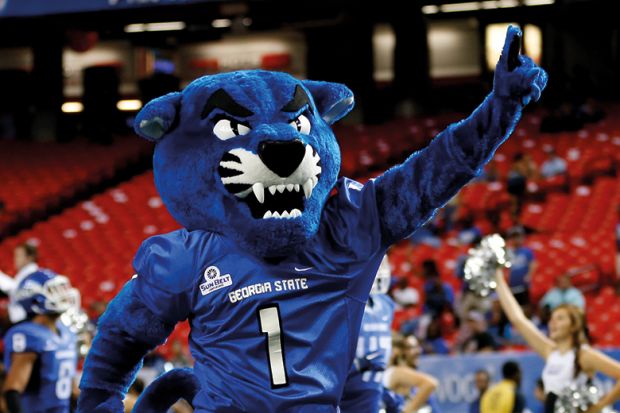After 10 years of innovations to help low-income and minority students on an individual basis, Georgia State University is collecting some major national awards; and, in its own neighbourhood, it’s also collecting admirers.
The honours – coming most recently from the annual conference of the American Council on Education, the major US higher education grouping – recognise the 53,000-student urban institution for fully eliminating disparities in graduation rates based on race, ethnicity and income.
Those cheering Georgia State’s president, Mark Becker, include one institution that might be forgiven if it instead had reacted with jealousy or even outright concern: the historically black Clark Atlanta University, barely a mile away from the Georgia State campus in downtown Atlanta.
Historically black colleges and universities, or HBCUs, are known to be struggling in the US as growing levels of legal protection and social acceptance provide minority students with a wider range of educational options.
Clark Atlanta is no exception. Itself a merger of two previous black-serving institutions, Clark Atlanta underwent heavy layoffs a decade ago, has graduation rates below 50 per cent and faces suggestions of further consolidation.
Georgia State, meanwhile, didn’t admit a black student until 1962, almost 50 years after its founding. And now with Professor Becker in charge, it’s become a place where black students are not only welcome but thriving.
A key element of that success is a strategy for keeping close tabs on individual students. Staff are quick to pick up on any who struggle in their classes, and then work to identify the causes and find solutions.
Rather than resent the added competition for minority student attention, Clark Atlanta is determined to learn from it. Just this year, it began its own “early alert system” to identify struggling students, said Obie Clayton, professor of sociology and criminal justice at Clark Atlanta.
“We really need to improve our graduation and our retention rates, and if we can learn ways to do that from a predominantly white institution, we’ll do that”, Professor Clayton said.
Such attitudes are not taken for granted, given the potential for institutional rivalries and race-based suspicions. In Maryland, the state has been fighting for more than a decade against a lawsuit brought by four HBCUs – Morgan State, Coppin State, Bowie State universities, and the University of Maryland Eastern Shore – which feel the state deliberately undermined them by funding competing programmes at traditionally white institutions.
There the hurt feelings are compounded by the success of the University of Maryland, Baltimore County, which is also a pioneer in the aggressive tracking of individual student progress. UMBC is a predominantly white institution built by the state just outside the city of Baltimore. Its long-time president, Freeman Hrabowski, is an African American raised in the segregated South who has also produced broad academic performance gains across racial categories.
The overall circumstances in the two states, however, are vastly different. Maryland has shown a long history of disenfranchising black colleges, said Marybeth Gasman, professor of education at the University of Pennsylvania and director of the Penn Center for Minority Serving Institutions.
HBCUs still serve a critical need in US higher education, said Professor Gasman. And ideally, she added, nearby traditional universities would partner with them to help deliver the types of advanced student analytics and tracking implemented by Georgia State and UMBC.
“I think that the majority institutions will learn a great deal from the HBCUs as well”, said Professor Gasman.




